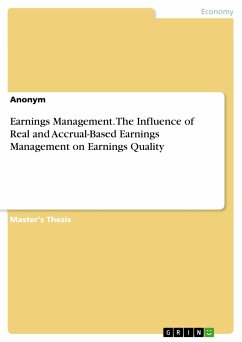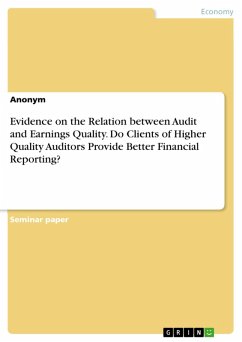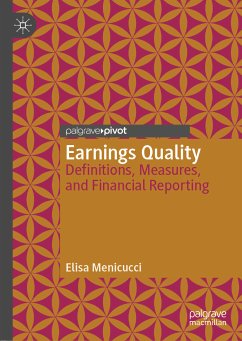
Earnings Management. The Influence of Real and Accrual-Based Earnings Management on Earnings Quality (eBook, PDF)
Sofort per Download lieferbar
Statt: 44,95 €**
29,99 €
inkl. MwSt. und vom Verlag festgesetzt.
**Preis der gedruckten Ausgabe (Broschiertes Buch)
Alle Infos zum eBook verschenkenWeitere Ausgaben:

PAYBACK Punkte
0 °P sammeln!
Master's Thesis from the year 2019 in the subject Business economics - Accounting and Taxes, University of Duisburg-Essen, course: Master Thesis, language: English, abstract: This paper delves into various theories and approaches, aiming to define and differentiate earnings management from related concepts such as fraud, expectation management, and impression management. It explores the goals and incentives driving earnings management, including maximizing or minimizing earnings, beating targets, and smoothing. At the onset of the new millennium, corporate scandals rocked the business world, e...
Master's Thesis from the year 2019 in the subject Business economics - Accounting and Taxes, University of Duisburg-Essen, course: Master Thesis, language: English, abstract: This paper delves into various theories and approaches, aiming to define and differentiate earnings management from related concepts such as fraud, expectation management, and impression management. It explores the goals and incentives driving earnings management, including maximizing or minimizing earnings, beating targets, and smoothing. At the onset of the new millennium, corporate scandals rocked the business world, eroding trust in management, boards of directors, and the accounting profession. In response, regulations and policies aimed at enhancing corporate governance and financial reporting were swiftly implemented. The credibility, clarity, and consistency of financial reporting practices play a pivotal role in enabling investors to make informed decisions. Accurate and fair financial performance representations, as opposed to inflated and misleading figures, are essential for market players, including shareholders and creditors. Investors rely on audited financial reports to guide their investment decisions, underscoring the critical importance of accuracy and reliability in publicly available financial disclosures. Auditors, by reducing the risk of material misstatement, ensure the integrity of the information disclosed in a company's financial statements. Management, with the goal of achieving promised targets and ensuring the company's existence, may engage in earnings management as a strategic contribution to corporate policy. Financial reporting serves as a means to distinguish well-performing companies from their counterparts, facilitating efficient resource allocation and empowering stakeholders to make effective decisions. The disclosed earnings results significantly impact a firm's overall business activities and management decisions, particularly in satisfying analysts' expectations, which can influence equity value. While accounting standards play a role, the quality of financial statements is more influenced by company-specific and institutional factors shaping managers' incentives. These factors lead to financial reporting practices being viewed as the outcome of a cost-benefit assessment.
Dieser Download kann aus rechtlichen Gründen nur mit Rechnungsadresse in A, B, BG, CY, CZ, D, DK, EW, E, FIN, F, GR, HR, H, IRL, I, LT, L, LR, M, NL, PL, P, R, S, SLO, SK ausgeliefert werden.













